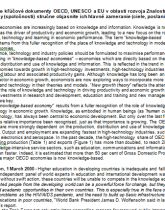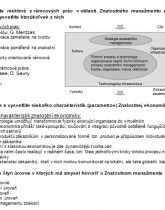Hľadaj
Zobraz:
Univerzity
Kategórie
Rozšírené vyhľadávanie
45 144
projektov
Vypracované otázky na skúšku z predmetu Znalostný manažment
| Prípona .doc |
Typ poznámky |
Stiahnuté 12 x |
| Veľkosť 0,1 MB |
Jazyk slovenský |
ID projektu 8445 |
| Posledná úprava 07.03.2018 |
Zobrazené 2 433 x |
Autor: - |
 Zdieľaj na Facebooku
Zdieľaj na Facebooku |
||
| Detaily projektu | ||
- cena:
5 Kreditov - kvalita:
88,2% -
Stiahni
- Pridaj na porovnanie
- Univerzita:Paneurópska vysoká škola
- Fakulta:Fakulta ekonómie a podnikania
- Kategória:Ekonomika » Management
- Predmet:Znalostná ekonómia a manažment
- Študijný program:-
- Ročník:2. ročník
- Formát:MS Office Word (.doc)
- Rozsah A4:7 strán
1A) Uveďte kľúčové dokumenty OECD, UNESCO a EU v oblasti rozvoja Znalostnej ekonomiky (spoločnosti) stručne objasnite ich hlavné zameranie (ciele, poslanie)
The OECD economies are increasingly based on knowledge and information. Knowledge is now recognised as the driver of productivity and economic growth, leading to a new focus on the role of information, technology and learning in economic performance. The term “knowledge-based economy” stems from this fuller recognition of the place of knowledge and technology in modern OECD economies.
OECD science, technology and industry policies should be formulated to maximise performance and well-being in “knowledge-based economies” - economies which are directly based on the production, distribution and use of knowledge and information. This is reflected in the trend in OECD economies towards growth in high-technology investments, high-technology industries, more highly-skilled labour and associated productivity gains. Although knowledge has long been an important factor in economic growth, economists are now exploring ways to incorporate more directly knowledge and technology in their theories and models. “New growth theory” reflects the attempt to understand the role of knowledge and technology in driving productivity and economic growth. In this view, investments in research and development, education and training and new managerial work structures are key.
The term “knowledge-based economy” results from a fuller recognition of the role of knowledge and technology in economic growth. Knowledge, as embodied in human beings (as “human capital”) and in technology, has always been central to economic development. But only over the last few years has its relative importance been recognised, just as that importance is growing. The OECD economies are more strongly dependent on the production, distribution and use of knowledge than ever before. Output and employment are expanding fastest in high-technology industries, such as computers, electronics and aerospace. In the past decade, the high-technology share of OECD manufacturing production (Table 1) and exports (Figure 1) has more than doubled, to reach 20-25 per cent. Knowledge-intensive service sectors, such as education, communications and information, are growing even faster. Indeed, it is estimated that more than 50 per cent of Gross Domestic Product (GDP) in the major OECD economies is now knowledge-based.
The OECD economies are increasingly based on knowledge and information. Knowledge is now recognised as the driver of productivity and economic growth, leading to a new focus on the role of information, technology and learning in economic performance. The term “knowledge-based economy” stems from this fuller recognition of the place of knowledge and technology in modern OECD economies.
OECD science, technology and industry policies should be formulated to maximise performance and well-being in “knowledge-based economies” - economies which are directly based on the production, distribution and use of knowledge and information. This is reflected in the trend in OECD economies towards growth in high-technology investments, high-technology industries, more highly-skilled labour and associated productivity gains. Although knowledge has long been an important factor in economic growth, economists are now exploring ways to incorporate more directly knowledge and technology in their theories and models. “New growth theory” reflects the attempt to understand the role of knowledge and technology in driving productivity and economic growth. In this view, investments in research and development, education and training and new managerial work structures are key.
The term “knowledge-based economy” results from a fuller recognition of the role of knowledge and technology in economic growth. Knowledge, as embodied in human beings (as “human capital”) and in technology, has always been central to economic development. But only over the last few years has its relative importance been recognised, just as that importance is growing. The OECD economies are more strongly dependent on the production, distribution and use of knowledge than ever before. Output and employment are expanding fastest in high-technology industries, such as computers, electronics and aerospace. In the past decade, the high-technology share of OECD manufacturing production (Table 1) and exports (Figure 1) has more than doubled, to reach 20-25 per cent. Knowledge-intensive service sectors, such as education, communications and information, are growing even faster. Indeed, it is estimated that more than 50 per cent of Gross Domestic Product (GDP) in the major OECD economies is now knowledge-based.
Kľúčové slová:
znalostná ekonomika
zameranie
kompetentnosť
stratégia
perspektíva
rámcová práca
aktíva organizácie
Obsah:
- 1A) Uveďte kľúčové dokumenty OECD, UNESCO a EU v oblasti rozvoja Znalostnej ekonomiky (spoločnosti) stručne objasnite ich hlavné zameranie (ciele, poslanie)
1B) Uveďte príklady externých štruktúr „neuchopiteľných“ (znalostných) aktív organizácie
1C) Vysvetlite príčinu niekdy aj veľmi významného rozdielu trhovej a účtovnej hodnoty úspešných firiem
2B) Uveďte príklady interných štruktúr „neuchopiteľných“ (znalostných) aktív organizácie
3B) Vysvetlite pojmy kompetencia a kompetentnosť a ich hlavný rozdiel
3C) Uveďte dva, tri príklady definícií Znalostného manažmentu (Knowledge Managementu)
4A) Uvedťe názov, cieľ, zameranie a štyri kľúčové oblasti „národnej“ stratégie zameranej na rozvoj Slovenska ako Znalostnej ekonomiky (spoločnosti)
4B) Uveďte niektoré z rámcových prác v oblasti Znalostného manažmentu a stručne opíšte a vysvetlite ktorúkoľvek z nich
4C) Uveďte a vysvetlite niekoľko charakteristík (parametrov) Znalostnej ekonomiky
5A) Uveďte štyri úrovne v ktorých má zmysel hovoriť o Znalostnom manažmente
5B) Uveďte (vlastnými slovami) základné prvky pri zavádzaní Znalostného manažmentu do praxe organizácie
5C) Uveďte perspektívy cez ktoré je možne sa pozrieť na Znalostný manažment a objasnite bližšie niektorú z týchto perspektív






